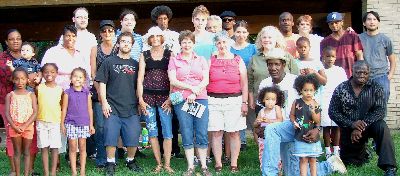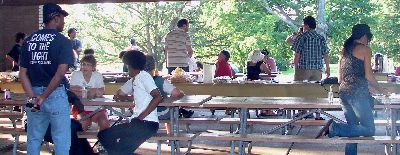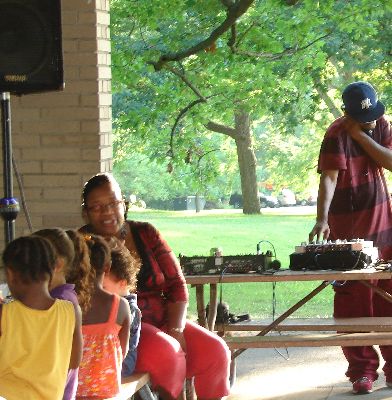The Fight Against Mayoral Control: Celebrating Victories, Pushing Forward
Primary tabs
The Community Education Task Force (CETF) has a lot to celebrate. At the beginning of the year, it seemed inevitable that the mayor would control the Rochester City School District, rather than an elected Board of Education. However, after a defeat in the NY State Senate, the plan is off the table — for the time being at least.
Victories like this can be rare for grassroots community groups, but the CETF is not resting (although they did throw a party in Genesee Valley Park with free food, games, and music). They hope to use their current momentum to promote bottom-up control of the city schools.
At the CETF's Free Food For Free Minds party, I talked with several members of the CETF about the past eight months and their plans for the future.

Howard Eagle (Activists Against Racism Movement):
A lot went into this. Our coalition — the community education task force — which is made up of a number of grassroots community organizations and individuals, first formed back in January of this year, shortly after we heard that Robbert Duffy, David Gantt, Joe Morelle, and others wanted to take control of the Rochester school district. We knew right away we had to organize against what they were trying to do. For one thing, they were trying to take away people's right to vote for their local representatives. It also became clear to us that they didn't know anything about education.
Jake Allen (Students for a Democratic Society):
I think we've done something that's pretty much unprecedented. In most places where they've attempted to institute mayoral control they've been successful. This is really groundbreaking.
A lot of very powerful forces came together, especially those at the grassroots level. People did a lot of the on-the-ground organizing, in communities and neighborhoods, to really draw a lot of attention to this issue. Having the trade unions on our side definitely helped. It was a groundswell unlike any that I've ever seen.
Howard Eagle:
We formed around one issue: to stop mayoral control. We've worked together for nearly eight months and we have stopped it. It could be that that's temporary, in terms of them coming back again and attempting to get this passed. But, in the process of working together over those eight months, we began to ask the question what's next? We began to ask if we wanted to get involved in the work of really bringing about authentic, widespread, genuine reform. And the task force answered "yes, we do."
They attempted to paint us as supporters of the status quo. Some of us have been working in this community for decades and we've never supported the status quo.
For several weeks, we've been working on a plan: on principals for change. We're going to present [the plan] to the community as a comprehensive plan that [mayoral control proponents] couldn't produce. We're going to produce it.
Bonnie Cannan (Green Party of Monroe County):
That's one of the points: If we don't do the major changes that are really fundamental to the problem, then why should we waste our time playing games? And that's what mayoral control is because the people who advocate that don't have an interest in solving the real problems.
The key to [successful organizing] is to be very aware of what strategies you want to use depending on the situation. We used street rallies, public hearings, town hall meetings. We didn't let the other side dictate to us what we're going to do. Then you have to have endurance, you have to really stick to it.
The first approach was to do a lot of strong public actions, which were very important. Right now we are in more of a critical thinking process. You try to come up with ideas that are critical to the system being changed. There's more process involved. We have to have more detail. You have to be able to say to people here's the basic premise we're coming from and here's some of the ideas we'd like to implement so that happens.
It's more being on the offense — in a good way. It's premature to say we're there yet. But it's better to be in a position where you can present solutions.

Howard Eagle:
We had — just to name some of the organizations that have been part of our organization — Activists Against Racism Movement, Rochester Indymedia, Rochester Students for a Democratic Society, Vision Ministries International, Center for the Study of Civil and Human Rights Laws, The Green Party of Monroe County, Alliance for Quality Education, and a number of individuals who are affiliated with organizations, but are not necessarily representing those organizations at our table. Since early January until today, we have met every Wednesday except for a couple where we were involved in activities that were related to this issues. We have protested, we have demonstrated, we have lobbied, we have attended city council meetings.
That effort — that united strong effort — is really what turned this around. They thought it was a done deal, that they would be able to slide this past people without meeting any resistance. But we organized quickly and we put up that resistance and together we stopped it. We have to continue that work to make sure that mayoral control never exists in the city of Rochester.
Nancy Cuminale (Activists Against Racism Movement):
 I think it's going to come back around, it's not dead. But in the meantime, our work is to continue to look at ways to reform the system. It's not anything new, some of us have been doing it for a long time. However, I think that the task force is an opportunity to keep moving forward. We came together around opposing one issue, but now we're moving forward.
I think it's going to come back around, it's not dead. But in the meantime, our work is to continue to look at ways to reform the system. It's not anything new, some of us have been doing it for a long time. However, I think that the task force is an opportunity to keep moving forward. We came together around opposing one issue, but now we're moving forward.
We're working on putting the so-called "meat on the bones" of the reform plan that we're talking about. We meet every Tuesday night at 509 Joseph Avenue, 5:30-7:30 and everybody's welcome to join us.
Jake Allen:
I think now is our moment. The [corporate] media actually showed up to this event today. We have their ear. Now's the moment to crystallize a coherent next step forward.
Note: Although this article is written as a single conversation, each interview was conducted separately.









